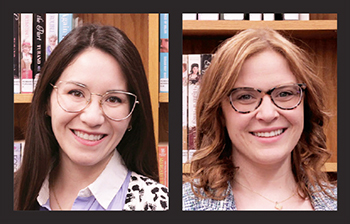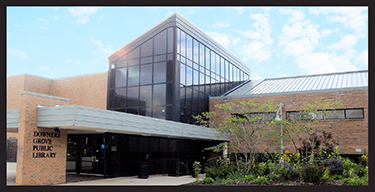Standing Up to Hate and Misinformation | Censorship
When a planned event came under attack, Downers Grove Public Library staff handled the hostilities, keeping safety a priority.
 Challenging Times As intellectual freedom attacks gain momentum, they increasingly call for all hands on deck to battle censorship campaigns and threats. LJ takes a look at some of the leading conflicts, how one library weathered hostilities (below), and ways to be ready when challenges come to you.
Challenging Times As intellectual freedom attacks gain momentum, they increasingly call for all hands on deck to battle censorship campaigns and threats. LJ takes a look at some of the leading conflicts, how one library weathered hostilities (below), and ways to be ready when challenges come to you.
When a planned event came under attack, Downers Grove Public Library staff handled the hostilities, keeping safety a priority
In celebration of National Coming Out Day during LGBTQIA+ History Month, the Downers Grove Public Library (DGPL), IL, planned a Drag Queen Bingo program for grades 7–12 on October 11, 2022. The event was to include bingo games, with prizes provided by the Teen Program Coordinator, and snacks. A drag performer would call the numbers and do a short, age-appropriate lip-sync to “Firework” by Katy Perry. The drag performance was to be a celebration of self-identity and self-expression, highlighting a joyous and historically significant part of LGBTQIA+ culture on an important day. Programs that affirm and reflect identities in positive ways can be life-saving, and this one would have been significant for LGBTQIA+ teens.
On August 28, screenshots of the program from the library’s newsletter and online calendar began to circulate on social media. Local factions that described themselves as “parental rights advocates” immediately began to bombard the library with hostile email, letters, phone calls, and in-person complaints demanding the cancellation of the event and using slurs against employees. The event was ultimately cancelled for safety concerns after a bullet was mailed to the DuPage County Police department anonymously with a note addressed to the library stating, “More to come.” DGPL is still dealing with the aftermath, which includes ongoing messaging in opposition to materials and programs. Staff continue to process the trauma they experienced.
 |
Cindy Khatri (l.) and Amanda Klenk. Photos courtesy of Downers Grove Public Library |
Amanda Klenk: Few, if any, librarians create a program thinking that congressional candidates will be debating it as their election draws near. It’s definitely not what I had in mind when I started planning Drag Queen Bingo for teens. Yet that’s exactly where I found myself last fall as we navigated the community response to the program.
Over the course of those weeks, we went into crisis-management mode to communicate with the community and did everything in our power to continue the program. While the director and marketing team took the lead in creating public statements and responses, I was responsible for the program itself.
Cindy Khatri: I oversee the marketing and communications of the library and take the lead on all media requests. I saw comments of all kinds pour in at a rapid pace as soon as news broke of our event. It was essential to quickly get everyone on the same page. After speaking with our incredibly brave director, Julie Milavec, and the rest of my team, we decided to take this as an opportunity to center the LGBTQIA+ community and use our platform to explain why libraries are doing equity, diversity, and inclusion work. We discussed why we chose to pursue this program and what it could do for the community, sharing why libraries house materials and programs that speak to a variety of audiences. With each response the library issued, more feedback arrived, both positive and negative. It felt like a vicious circle that continued to prompt itself: The more violently vocal the opposition became, the more local and regional media paid attention and wanted the library to respond. Once we responded, the flames of anger were stoked and the cycle started again.
Looking back, I’m still shocked by the avalanche of hate, vitriol, support, and love. The event drew patrons out of the woodwork to share comments about their approval and disapproval of the program. I expected patrons who opposed the event to send in angry emails, and perhaps voice their opposition at the next board meeting, but I never anticipated the personal attacks, the ongoing fixation, and the relentless harassment of the library.
AK: Responses flooded our inboxes with criticisms, including opinions on taxpayer money use and the appropriateness of hosting a drag queen or LGBTQIA+ program for teens at the library, which reflected a lack of understanding about my expertise to budget and create age-appropriate programs. There was also a general ignorance about what drag is.
This was a program targeted to meet the expressed needs and wants of teens and completely optional to attend, yet patrons were screaming at staff, cutting up their library cards and mailing us the remnants, and spewing hate on social media. Soon local media were reporting on it, congressional candidates were weighing in and using it to leverage campaign funds, and it became a polarizing conversation in our community. All of this was incredibly hard to cope with. The days were long and filled with anxiety. I brought all of the emotional baggage home with me each night. It felt like it might never end.
 CK: The feedback the library received is a microcosm of the larger national divide. It was shocking how brave people are behind their keyboards. Letters in support of the library brought tears to my eyes as patrons shared their own experiences, naming programs like Drag Queen Bingo as lifesaving. The messages of compassion, care, validation, and support gave us strength to make it through the most difficult time of my career. On the other hand, messages from fierce dissenters were so full of anger it was clear the sender had responded in a knee-jerk reaction. Their words, filled with a fundamental misunderstanding of what libraries stand for as well as a blatant disregard of others’ humanity, broke my heart. On both sides, I recognized names from growing up and living in the community. It was affirming and devastating at the same time. Equally shocking was the amount of feedback—both positive and negative—we received from neighboring communities and people all over the country.
CK: The feedback the library received is a microcosm of the larger national divide. It was shocking how brave people are behind their keyboards. Letters in support of the library brought tears to my eyes as patrons shared their own experiences, naming programs like Drag Queen Bingo as lifesaving. The messages of compassion, care, validation, and support gave us strength to make it through the most difficult time of my career. On the other hand, messages from fierce dissenters were so full of anger it was clear the sender had responded in a knee-jerk reaction. Their words, filled with a fundamental misunderstanding of what libraries stand for as well as a blatant disregard of others’ humanity, broke my heart. On both sides, I recognized names from growing up and living in the community. It was affirming and devastating at the same time. Equally shocking was the amount of feedback—both positive and negative—we received from neighboring communities and people all over the country.
AK: So many validating and empowering stories poured in from residents. At the end of the day, the positive responses outweighed the negative. Downers Grove was speaking up for the library and for the LGBTQIA+ community. Each day, I tried to find something positive to hold on to: Community members who spoke up in support or dropped in to check on us, hearing from the teens and parents who were registered, having coworkers who saw the importance of the program and who upheld our library’s values. All of this helped me refocus and stay the course. I am lucky to be at a library that not only supported me but truly stood behind the program.
CK: Misinformation ran rampant, with social media and news sources trying to get the story out as fast as possible. It helped to create a central place to update a FAQ, where we frequently pointed patrons and media. Tracking feedback in a spreadsheet was an essential and gargantuan task that paid off when the Freedom of Information Act (FOIA) requests began to roll in.
AK: We learned via social media that people were planning to register just to fill the spots. What they didn’t realize was that we had the means to double-check and verify registrations. While we rarely do this, I wanted to make sure that only teens were attending. I trusted that teens and parents interested in the program would be okay with that. In fact, I think it helped demonstrate that safety was a priority. At the end of the day we had about 40 teens registered, which is far above average participation for us.
My other responsibility was maintaining communication with the presenter, Aurora Divine. I wanted to be as transparent as possible and give her the opportunity to decide whether to continue with the program. Luckily for us, she did not want to back down, and was flexible when we had ideas of moving the program offsite and to a different day. When I learned about the threat, I reached out to Aurora one last time. Like the rest of us, she was understanding of our decision but disappointed about the circumstances that led to the cancellation.
CK: Through the process, it felt as though my role was to be a voice for my colleagues who were being attacked, for libraries that are experiencing attacks on intellectual freedom, for those who are allies, and for those who are oppressed. The weight felt impossible, but imperative, to carry. At times, it was maddening to be so intimately involved in the chaos yet feel so helpless, with nothing to do but continue to speak into the void, hoping to connect. Leaning on my fellow staff members was crucial, and connecting with our supporters made a big difference in keeping my head up.
Months have passed and I’m still processing everything that happened; how I reflect on it changes weekly. Although I firmly believe that no one can truly be prepared for something like this, I’ve since created a new crisis plan for my department, which includes everything from the rules of drafting responses to details such as room setup for a press conference. Each crisis will look different, but I know one thing will be consistent—our library’s commitment to being a place for everyone to discover, grow, play, and learn. (See also “People Get Ready,” pp. 18–20.)
AK: We endured a lot and survived by leaning on each other. I often felt guilty, as though the program invited the continued backlash, something I’m still working through. However, I know it was the right program for so many teens; they let their voices be heard by registering for the program. Canceling Drag Queen Bingo may have meant one less fabulous performance of “Firework” to be enjoyed by the world, but it has only strengthened my resolve to provide teens with diverse programming and ensure that their voices are heard and matter in this world. I am so proud of our library and community for standing up to hate and misinformation. My hope is that as libraries across the country fight for everybody’s rights to be represented in collections, services, and programming, we show strength in numbers and stand together against hate and censorship.
Cindy Khatri is the Public Relations Manager and Amanda Klenk is the Teen Services Coordinator, both in Downers Grove Public Library, IL.
The world has more than enough hate, and I'm so thankful you continued with this program. We are having some issue at our library with folks opposing LGBTQ+ positive activities, so I am thankful you posted this (but not that you went through it). It was helpful to read.
Add Comment :-
RELATED
ALREADY A SUBSCRIBER? LOG IN
We are currently offering this content for free. Sign up now to activate your personal profile, where you can save articles for future viewing









